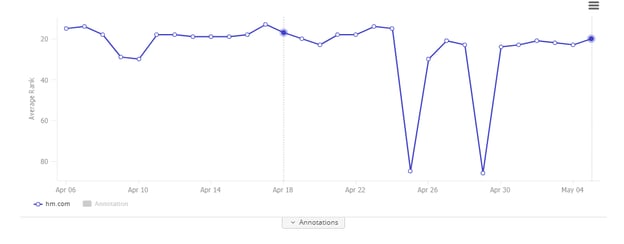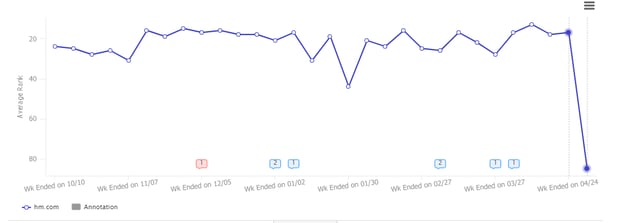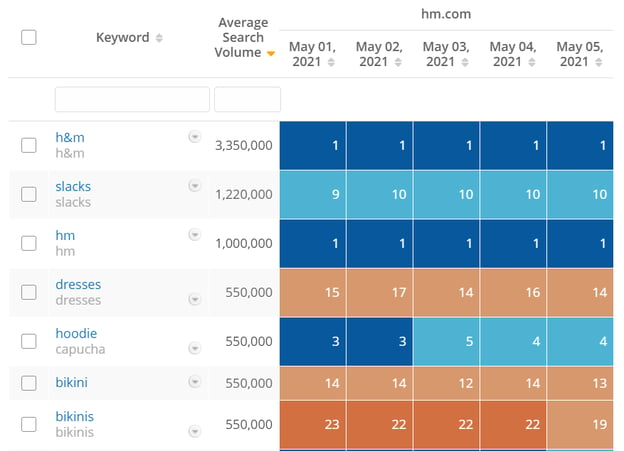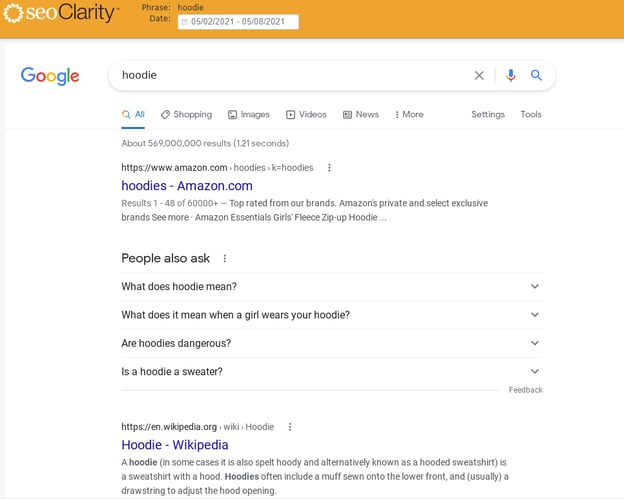SEO is an industry full of evolution and progression, but some may not realize just how often things change: organic ranking positions on the search engine results page change every day.
Your ability to update, optimize, increase, and protect your rank positions (and subsequently drive traffic and conversions) depends on your ability to know what is changing — and when.
Keyword rank tracking is vital for any SEO program, but daily keyword ranking data is a near-requirement if you want to stay up-to-speed on insights and strategize accordingly.
Google isn’t going to slow down, so if you don’t have the right resources you’re going to fall behind. In this blog, we'll discuss some of the main reasons why daily rank tracking is so beneficial for any SEO strategy.
Table of Contents:
Before we begin: There are many rank tracking tools on the market. Some rank trackers come in the form of a point solution while others, like Rank Intelligence, are integrated into a complete SEO platform. All screenshots used in this article are from Rank Intelligence.
What Is a Daily Rank Tracker?
A daily rank tracker is an indispensable tool for enterprise SEO professionals, providing a granular view of a website's search engine rankings for targeted keywords on a day-to-day basis.
This real-time insight enables SEO experts to swiftly identify trends, fluctuations, and the impact of SEO strategies or algorithm changes on a website's visibility.
By closely monitoring these daily keyword position shifts, businesses can adapt their SEO tactics proactively, ensuring they remain competitive in the ever-evolving digital landscape. Daily rank tracking also facilitates detailed competitor analysis, allowing enterprises to benchmark their performance against industry rivals.
The Advantages of Daily Rank Tracking for SEO
Now that you understand what daily rank tracking is, let's go into more detail on some of its key benefits.
#1. Up-to-Date Reporting
Let's start with the obvious — daily rank tracking allows you to see trends in near-real time. This means you don't have to wait for your ranking data to catch up with reality like you do with weekly data.
This advantage is particularly useful in the following three circumstances:
- Presenting to executives and earning trust
- Flagging volatile keywords
- Spotting instances of keyword cannibalization
Presenting to Executives and Earning Trust
If you operate on weekly data, the delay can confuse stakeholders and executives when you present your ranking report.
Since the search results can change every day, it’s more than likely that the SERP won’t match your ranking report. As a result, executives will inevitably question the discrepancy in the data vs. the SERP — and having people (especially stakeholders) question the validity of organic search is the last thing you need.
Recommended Reading: How to Gain Buy-In with an Enterprise SEO Dashboard
Look at the difference between the ranking data for the same query with daily versus weekly.
Daily:

Weekly:

Flagging Volatile Keywords
Daily rankings also help you discover volatile keywords that are on the verge of plummeting in rank position.
Imagine this: Your weekly data showed a major drop in rank after consistent performance, but in reality, the keywords had been fluctuating day by day previously.
With daily data, the keyword could have been flagged as volatile before the drop.
Clients can use Rank Intelligence’s trended view to see a heat map of keywords and their respective rank positions coded with a volatility score for easy analysis.

(Keyword volatility sorted by search volume.)
You can also set up rank change alerts to automate the ranking alert process. You'll be alerted when your rankings fall out of certain positions.
Spotting Instances of Keyword Cannibalization
Oftentimes, your own pages will compete with each other in the SERPs.
Keyword cannibalization (or the flip-flopping issue) occurs when Google doesn’t know which URL to rank for your keyword.
Daily ranking data clues you in on the frequency and severity of these cannibalization issues so you can optimize and ensure your desired URL ranks.
#2. Keeping a Precise Historical Ranking Record
A daily rank tracking tool offers a precise way to know when rankings have changed in the past. This is something that you just don’t get access to with weekly data.
A day-by-day record is especially useful when algorithm updates roll along. There have been quite a few unconfirmed algorithm updates in the past, but without daily data, it would be difficult to know of a potential update or its impact.
Daily data is also useful for monitoring volatility based on the competition (plus knowing when new competitors started to rank).
You can access a cached version of the SERPs with Rank Intelligence to see exactly what the results pages looked like at a certain point in time.
 (Access a historical look of the search engine results page with Rank Intelligence.)
(Access a historical look of the search engine results page with Rank Intelligence.)
#3. Aligning Analytics and Ranking Data Points
A daily record allows you to align your analytics data with your rankings. Because there’s a greater accuracy of the data with daily data, you can see the correlation more clearly. For example, you can see a more accurate CTR model.
You don’t want analytics data that’s only weekly, you want to be able to break that down by day. The same should be true for your ranking data. This granularity allows you to monitor your overall SEO strategy and correlate rankings with optimizations and other site changes.
Seeing a precise change in rank informs you of any subsequent changes in traffic. As my colleague Tyson wrote in his post on the importance of rank tracking:
When you have your rankings in a connected SEO platform you can more quickly see how rankings influence your other metrics.”
Is Daily Rank Tracking Too Much?
As Google continues to grow more sophisticated, daily rank tracking is going to become the standard. If you want weekly data, you’re going to miss out on valuable insights.
Enterprise brands use daily data to stay ahead.
Still having reservations? We think we know what it’s about …
If you think daily data is just going to be noise, we’ve solved this with weekly comparison options. You can easily digest your weekly views but can also dive into the specific days to compare with the power of daily. You get the best of both worlds!
If you think you won't react to the daily data’s insights, we can tell you this: You’ll react when the change is great enough. If there is a disaster, don’t wait six days to try to correct it. Weekly data increases the time from insight to action — the opposite of what you want to accomplish.
Lastly, if you’re still not certain that daily data is worth the investment, that’s completely your choice! The ultimate decision is up to you. If you choose weekly, that’s okay, but daily is even better. Just look at all the benefits listed above.
Better yet, let us demonstrate it to you with a personalized demo:
Conclusion
You’ve invested time in keyword research and the content creation process to improve SERP visbility — don’t limit yourself when it comes to the insights that investment creates.
As your focus sharpens on specific areas, the necessity for a daily rank tracker increases. There are certain (highly-valuable) use cases that can only be achieved with daily data:
- Up-to-date reporting
- Historical record keeping
- Aligned data points
<<Editor's Note: this post was originally published in May 2021 and has since been updated.>>







Comments
Currently, there are no comments. Be the first to post one!